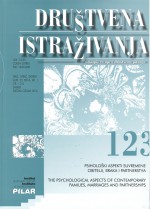Parental Behaviors in the Context of Adolescent Disclosure (PBAD): Instrument Development
Parental Behaviors in the Context of Adolescent Disclosure (PBAD): Instrument Development
Author(s): Ana Tokić, Ninoslava PećnikSubject(s): Psychology
Published by: Institut društvenih znanosti Ivo Pilar
Keywords: parent-adolescent communication; adolescent self-disclosure; antecedents of disclosure; parental reactions to youth disclosure; parenting
Summary/Abstract: The aim of the study was to develop an instrument for measuring the Parental Behaviors in the Context of Adolescent Disclosure (PBAD) and to examine its dimensionality, internal consistency, predictive and construct validity. The scale has been developed on the basis of a qualitative study of adolescents' views (Tokić & Pećnik, 2011) and consists of 2 subscales: the PBAD-A (antecedents of disclosure) and PBAD-R (reactions to previous disclosures). It was implemented with 1074 adolescents (13-year-olds) from 50 schools in Croatia (probabilistic cluster sample). Adolescents also reported on disclosure about daily activities, feelings and concerns. Youth gave estimations for mothers and fathers separately. Latent structures of the PBAD-A and PBAD-R were interpretable and reasonably congruent for mothers and fathers. Factor analyses of the PBAD-A revealed three factors: Initiating conversation, Intrusiveness and Unavailability. Factor analyses of the PBAD-R yielded three factors: Support and respectful guidance, A let- -down and Punishment. Internal consistency for all factors was acceptable (0.75 – 0.92). All except one of the extracted factors of the PBAD correlated with actual disclosure to mothers and fathers about daily activities, feelings and concerns significantly and in the predicted direction, which supports the predictive and construct validity of the instrument.
Journal: Društvena istraživanja - Časopis za opća društvena pitanja
- Issue Year: 23/2014
- Issue No: 01
- Page Range: 67-85
- Page Count: 19
- Language: English

